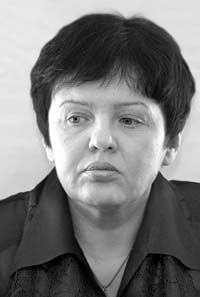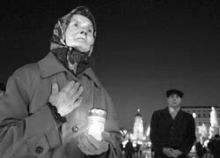A documentary on the Great Famine of 1932-33 in Ukraine was recently aired on one of the Ukrainian channels, or so they say. I’m telling you this because my late husband, James Mace, contributed to this film, and in one episode I provided a brief history of the making of Famine ‘33. The People’s Memorial Book compiled by the unforgettable Volodymyr Maniak and Lidia Kovalenko. It is thus safe to say that I would have heard about any public response to this truly extraordinary film. The film’s creators have noted that even though it was aired at the UN and received high acclaim from foreign audiences, bringing it to Ukrainian viewers has been both a difficult and simple process: the documentary was aired on the wrong day and at the wrong time, as if someone just wanted to add another fat checkmark to the make-believe list of “national revival” efforts. The same well-wishers went ahead with plans to refashion the legendary film studio Ukrtelefilm into yet another money spinner. In a bid to save his studio, general director Oleh Biyma went into hiding to avoid signing the papers for the sale. I will return to the film and the things that were captured on screen, and omitted, further down the page.
A small group of cinematographers, writers, and scholars recently gathered at Kyiv’s Cinema House to meet with Ukraine’s President Viktor Yushchenko and Ukrayina 2000 Fund director Kateryna Yushchenko. The documentary in question sparked a serious and fundamental discussion of the problems of culture, the humanities, and the government’s policy in the spiritual sphere in the broadest sense. Oleh Biyma, who had suddenly “recovered from a protracted illness,” earnestly shared his impressions of the meeting: “I don’t remember ever seeing even the lowest-ranking officials from the Ministry of Culture at such gatherings, and here we have the president himself coming to this one. Too bad those same officials, journalists, famous scholars, or cultural figures didn’t put in an appearance.”
Indeed.
There was no crowd elbowing its way into the Cinema House, no representatives of ministries or departments, no humming tape recorders, and no journalists. We obviously can’t keep up with our president. After a whole day of meeting with ministers, introducing a newly-appointed oblast administration chairman, and attending various functions, he spends three hours in the evening sitting in a movie theater watching, listening, answering, and asking questions. Obviously not everyone will be able to keep up the pace that the head of state is setting. This was my first conclusion after a seemingly ordinary event — the airing of the documentary Portrait of Darkness, directed by Serhiy Dudka and written by Bohdan Hnatiuk. The film was followed by a discussion; I am omitting all the remarks, speeches, and comments that bored me stiff. You’ve heard it all before: the government is neglecting culture; Ukrainian filmmaking is in decline; no films for children and youth have been produced in the last thirteen years; historical monuments are disappearing; churches are not being rebuilt; what with all those chauvinists, reactionaries, etc.
The president’s talk — and that’s what it was, a talk, not an official speech from a person in an official capacity — was brief and concise, and I suspect that many in the audience were ashamed of their tired harangues, which were a shameless waste of President Yushchenko’s time, especially considering that he places so much value on it.
If the president’s words carry any weight, then Ukrainian viewers will see this documentary on the right day and at the right time. “We are negotiating with Russia about the transfer of historical relics that are cherished by all Ukrainians. We have things to offer the Russians that they cannot decline. I have proposed to Volodymyr Putin that Russia establish patronage over the neglected cemetery of the soldiers from the Brusyliv Regiment. This is the brainchild of a righteous man, who is guarding a Sich Riflemen’s cemetery near Mt. Makivka in western Ukraine. In return, I will request access to Ukrainian graves in GULAG and Ukrainian settlements in Siberia. I will request permission to rebury in the Ukrainian pantheon our hetmans who were murdered in Russia, and Oleksandr Dovzhenko, who asked to be buried in Ukraine. I’m certain that Symon Petliura will soon find eternal peace in Ukraine. With Poland and Sweden we are negotiating the transfer of Bohdan Khmelnytsky’s regalia. We should not be asking for anything. We have colossal Polish archives. The first thing that Western humanities scholars asked me during our meetings was to open access to Ukrainian archives; not tourist venues or scientific know-how, but primarily archives.” (Speaking of archives, I was amazed to learn about a Western scholar’s attempts to purchase or at least copy Prince Kurbsky’s letters to his mistress, which are stored at a library in Lviv. He offered to pay as much as $300, even though libraries are not specialized archives and are open to everyone). The president also touched upon the reconstruction of churches. “The Tithe Church must be rebuilt. Wherever he went, Hetman Kalnyshevsky would build wooden churches, miraculous gems of Cossack baroque architecture. It should be an honor, not a duty, for every oblast state administration head to become the patron of two or three of these buildings, in Baturyn, Chernihiv. You don’t need any promotion. You have to draft some plans and knock on the doors of ministries and the president. There is no Ukrainian film archive. Is everything in Russia? Where? What can the government do? It can bargain and barter, or even buy, for that matter.
Viktor Yushchenko’s feelings about the Holodomor of 1932-33 are a subject for a separate discussion not suited to a newspaper publication. I will digress briefly. At countless conferences, lectures, forums, and symposiums, the late James Mace of blessed memory, consultant and contributor to The Day, repeated his childishly naХve dream as though it were an incantation. He wanted every Ukrainian to place a lit candle in the window to symbolize the living spirit of the nation, and to do this on the last Saturday of November, when people in the West commemorate the victims of the Holodomor. This idea was met with general approval and nodding heads. James knew that it wasn’t necessary to convince the world that Ukraine had lived through hell, but only to have Ukrainians realize the scope of our great catastrophe. And this would be the beginning of the healing process and realization of our past and future. In this tiny flame he saw the grandest of national monuments, the blaze of the nation’s future development. After surviving four operations and a near-death experience, bandaged all over and emaciated, Professor Mace addressed the Ukrainian parliament. On the following day his speech was published in The Day. The newspaper launched a nationwide drive with a succession of impressive articles. It seemed that in those days only one newspaper was bleeding with pain, attempting to get through to fellow journalists with every issue and fighting total indifference and officials’ total apathy. A little more and this subject would have been silenced and trampled into the ground. Viktor Yushchenko, who was then a politician under fire from the country’s leadership, joined in this drive in a manner befitting a statesman. For me, the flame of the Orange Revolution was touched off in St. Michael’s Square, when Kyivans gathered for a mass prayer of commemoration and lit 30,000 candles; when an old lady lined up 9 burning candles whispering, “This one is for you, Vania, this one is for you, Katiusha, and this one is for you, Petryk.” The media were gagged and did not report this event, except for a glimpse of the square without Yushchenko and a few lines in the press. But the residents of Kyiv changed after visiting St. Michael’s Square. They experienced catharsis. Late into the night small lights flickered in the windows of citizens, who two years later elected the people’s president.
Without a doubt, the Holodomor is a deeply personal issue for Viktor Yushchenko. The famine claimed 400 lives in his native village of Khoruzhivka; the names of only three dozen victims are known. “People without memory are invalids. I have children. I don’t want them to be invalids. Together we will plant a grove of highbush cranberries by Askold’s Grave with bushes from every village and town. We will revive the competition for the best monument to Holodomor victims. Ukraine has a large support group in the West, which includes the most celebrated actors, filmmakers, politicians, and business people. We must shoot films that the world will see; we must build a country that the world will admire. We have people who are willing to undertake the colossal work of reviving historical memory and historical justice; we have a government that is willing to provide moral and financial support. We must coordinate our efforts and focus on the main things, and individually undertake at least a small share of work and bring it to completion: not everything at once, but gradually and in concert.”
Portrait of Darkness awaits its viewers. But so much has been left off camera. The American Yevhenia Dallas appears in a brief interview, too brief to recount how her family died; how she became swollen with hunger in the famine capital, Kharkiv; how, as a little girl, she was raped by the director of her children’s home. She has published her memoirs in Ukrainian and Russian with a small press run; they are a ready-made script for an epic. The film features accounts by Holodomor eyewitnesses: victims because they lived in those days, heroes because they survived and told the world. I know how much selfless work this issue requires. Working on enthusiasm alone, and owing to their tremendous perseverance and unparalleled talent, Serhiy Dudka and Bohdan Hnatiuk shot, produced, and edited the film. The documentary will be subject to a detailed analysis and the scrutiny of filmmaking professionals. They will be followed by reviews and prizes, without a doubt. Meanwhile, I have come to another conclusion: we have been taken aloft on the wings of history. Our flight will be very long and extremely difficult.








